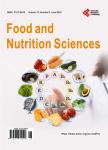Nutritional Composition, Physical Characteristics and Sanitary Quality of the Tomato Variety Mongol F1 from Burkina Faso
Nutritional Composition, Physical Characteristics and Sanitary Quality of the Tomato Variety Mongol F1 from Burkina Faso作者机构:Département Technologie Alimentaire Institut de Recherche en Sciences Appliquées et Technologies Centre National de la Recherche Scientifique et Technologique Ouagadougou Burkina Faso Centre de Recherche en Sciences Biologique Alimentaire et Nutritionnelle (CRSBAN) Université Ouaga 1 Pr Joseph KI-ZERBO Ouagadougou Burkina Faso Université Ouaga 1 Pr Joseph KI-ZERBO Ouagadougou Burkina Faso
出 版 物:《Food and Nutrition Sciences》 (食品与营养科学(英文))
年 卷 期:2017年第8卷第4期
页 面:444-455页
学科分类:1002[医学-临床医学] 100214[医学-肿瘤学] 10[医学]
主 题:Tomato Mongol F1 Characteristics Nutrient Trace Metal
摘 要:Tomato (Lycopersicon esculentum Mill) is quantitatively the highest vegetable consumed in Burkina Faso. The objective of this study was to evaluate the physico-chemical, nutritional characteristics, and sanitary quality of the tomato variety Mongal F1 from different production sites. Twenty-eight (28) samples of Mongal F1 fresh tomatoes were collected from 28 producers at three different localities of Ouahigouya, Loumbila and Ouagadougou. The physico-chemical and nutritional characteristics were determined by standardized methods and the traces metallic elements by atomic absorption spectrophotometry. The results revealed a degree brix varying from 4.07° to 5.50° and a pH ranging from 3.71 to 4.08 corresponding to a total acidity of 0.39% to 0.55% citric acid equivalents. The moisture content, the ash content, the total carbohydrates content, the reducing carbohydrates content, the lipids content and the protein content were ranged from 95.09% to 96.17%, 9.25% to 10.60%, 47.00% to 53.43%, 30.03% to 41.21%, 3.04% to 7.71% and 17.09% to 25.03% respectively. The results of the trace metals showed a high accumulation of total cadmium from 0.11 to 0.22 ppm, of total lead of 1.15 to 1.27 ppm and arsenic total of 0.19 to 0.20 ppm. The results proved that environmental conditions influence the quality of the tomato Mongal F1. Detection of trace elements in the tomato fruits suggests that a better production practices are needed.



